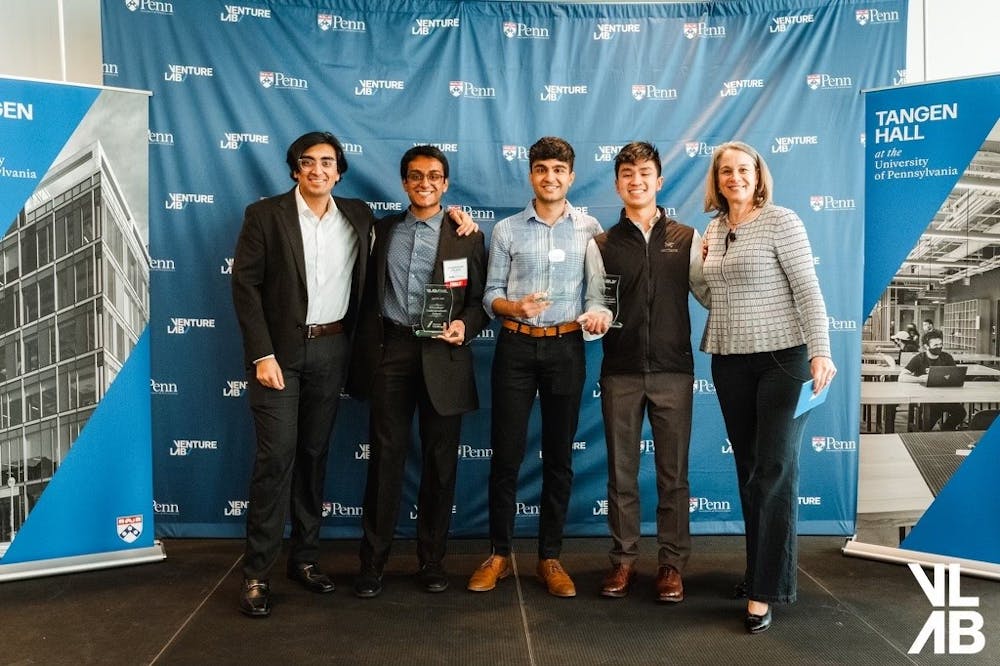ToxiSense, a biopharmacology venture founded by four Penn first years, seeks to develop a cheaper and more sustainable test for clean drinking water, and was awarded $85,000 at the 2022 Venture Lab Startup Challenge.
Venture Lab’s Startup Challenge is an annual competition for Penn student entrepreneurs to pitch their ideas to alumni judges and a live audience, in hopes of earning cash to help launch their venture. This year, ToxiSense was the winner of the Perlman Grand Prize, the Robert S. Blank New Venture Collaboration Award, and the Frederick H. Gloeckner Undergraduate Award.
ToxiSense’s primary focus is detecting levels of endotoxins, disease-causing molecules in bacteria, in water, and in biopharmacological products. The current method for testing endotoxins is both environmentally damaging and expensive, relying on horseshoe crab blood which can cost as much as $60,000 per gallon.
Engineering first year Udit Garg, co-founder and Chief Operating Officer of ToxiSense, told The Daily Pennsylvanian how ToxiSense uses the Arabidopsis plant to create a more ecologically friendly solution to test endotoxins.
“We created a plant that will glow based on the endotoxin applied to it, and we did that using genetic engineering,” Garg said.
College and Wharton first year Aravind Krishnan, co-founder and Chief Executive Officer of ToxiSense, added in an interview with Axios Philadelphia that ToxiSense could produce a single endotoxin test for less than 50 cents compared to $19 for a test that uses horseshoe crab blood.
The idea behind ToxiSense was conceived over five years ago, when Krishnan went on an eighth grade class trip to the Jersey Shore.
“On this trip I learned from local ecologists the big problem of horseshoe crabs declining in population, and I learned that these horseshoe crabs are known as a keystone species that other species in the ecosystem rely on to survive,” Krishnan said. “I wanted to see if there was a better solution … so throughout high school, I pitched my ideas to professors at local universities and then conducted research.”
RELATED:
New student-created platform encourages students to express gratitude at Wharton
Wharton professor’s viral tweet sparks national debate on income inequality
Krishnan and Garg met in the fall 2021 semester and co-founded ToxiSense, going on to compete in a pitch competition for Penn Social Entrepreneurship Movement.
“Four days before the pitch competition, we changed our idea to ToxiSense because [Krishnan] had the research done, but we failed miserably in that pitch competition,” Garg said. “Honestly, we were on the brink of quitting.”
In January 2022, College first year Aarush Sahni, Head of Research and Development, and Wharton first year Andrew Diep-Tran, Chief Business Officer, joined ToxiSense. Despite confidence in their idea, none of them expected to be the grand prize winners of the Startup Challenge.
“The five-minute pitch we provided [in the finals] went pretty well, but at the same time, we’re like only freshmen,” Garg said. “There was a company competing [against us] from there, and the guy that pitched that company was a guest lecturer for my [Management 267] class three months prior.”
ToxiSense has already begun discussions with some organizations in the water testing market, where FDA approval is not required, unlike the biopharmaceutical market.
“We’re actually in talks with the Philadelphia Water Department, and we’re looking into how we can incorporate our test into their testing scheme,” Sahni said. “On top of that, we’re in contact with other water testing organizations like charities and NGOs.”
ToxiSense’s progress has accelerated significantly since winning the Startup Challenge, which has led the company to make lots of business decisions. For this summer, ToxiSense plans on using most of its money to continue researching and developing its product.
“As a biotech startup, we are very driven by science, and the research is at the core of what we do,” Krishnan said. “We’re spending the vast majority of what we received towards conducting research this summer to primarily increase the sensitivity of our testing method.”









